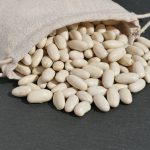Native peoples have used chia seeds for thousands of years, even though they are still fairly new to the mainstream health community. They are often used for medicinal, religious, and culinary purposes.
The traditional Mayans believed that chia seeds had the power to give supernatural powers and were often used by travelers to give them the energy they needed to make long journeys.
The Mexican Tarahumara tribe, who are known for their long distance running abilities, drink a mixture of chia seeds, lemon, and water which is called “Iskiate.” They believe that the chia seeds give them the strength to run for hundreds of miles. (Their whole foods, plant-powered diet probably doesn’t hurt, either.)
The tradition of using chia seeds includes grinding them into flour, pressing them for oil, and mixing them into drinks. To the ancient Aztecs, chia seeds were sacred and were used in sacrificial ceremonies.
80% of the world’s chia seeds come from South America, with the rest coming from various parts of the United States, Argentina, Australia, and Bolivia. The U.S. imported around 15,000 tons of chia seeds annually.
Health Benefits of Chia Seeds
1. They support your digestive health.
Chia seeds are rich in fiber, with a majority of that fiber being insoluble. This is great for your digestive system. Insoluble fiber sweeps the digestive tract clean and keeps it healthy.
Fiber intake has been linked with a reduced risk of several digestive diseases, including colorectal cancer.
The fiber in chia seeds nourishes the beneficial bacteria in your microbiome, which reduces inflammation throughout your body.
The minimum amount of fiber one should consume daily is 25 grams for women and 38 grams for men, though most people don’t even come close to that amount.
By incorporating a few tablespoons of chia seeds into your routine, you will be well on your way to meeting, and with the help of some fruits and vegetables, exceeding, the daily recommended intake of fiber.
2. They’re good for your brain.
Chia seeds contain omega-3 fatty acids, in fact they are the richest plant source of omega-3 fatty acids. Omega-3 fats are essential for brain function and improved cognition.
In a study of 34,600 college students were divided into two groups. One group was given 5 grams chia seeds everyday for 21 days and then tested. The group given the chia seeds performed better on testing compared to the control group.
3. They help keep your bones strong.
Chia seeds contain numerous minerals that are beneficial for maintaining bones, such as calcium, phosphorus, and magnesium. A study showed that people who increased their intake of plant-sourced calcium had a greater increase in bone density than those who didn’t. And animal studies have shown that rats fed a diet made up of 10% chia seeds over 13 months had significantly higher bone density than rats on a low calorie diet without chia seeds.
4. They can reduce inflammation.
Chia seeds contain a high amount of alpha-linolenic fatty acids (ALA). The ALA in chia seeds has an anti-inflammatory effect. Chronic inflammation has been linked to the development of various diseases, such as autoimmune diseases, infectious diseases, heart disease, type 2 diabetes, and certain cancers.
Inflammation is a big problem for people with metabolic syndrome, but luckily research has shown that ALA can help reduce it.
5. They keep your blood sugar stable.
Chia seeds contain high levels of fiber, which helps to regulate blood sugar levels. High-fiber foods take longer to eat and digest, which can help prevent blood sugar from spiking after a meal.
Fiber leads to satiety, or the feeling of being full after a meal.
Chia seeds are a good addition to the diet of people with diabetes, who often want to manage their blood sugar, weight and cholesterol. The fiber in this food help to slow down the rate at which glucose enters the bloodstream, which can help to keep blood sugar levels more stable.
The beneficial fats, fiber, and protein content in chia seeds makes them a good option for maintaining energy and steadying blood sugar levels. The ancient Aztecs used to take them as a food source for long walks at high altitudes.
In conclusion, chia seeds are safe for people with diabetes and offer benefits in controlling blood sugar and weight. They’re a smart, doctor-approved choice for people battling diabetes.
6. They’re good for your heart.
The ALA in chia seeds has been shown to protect your heart. A meta-analysis from 2012 looked at 27 studies that included 250,000 participants to see if there was a relationship between ALA intake and heart disease risk. The researchers found that people who consumed a high amount of ALA had a 10% lower risk of heart disease.
A study of 3,638 people found that those who consumed around 18 grams of ALA per day had a significantly lower risk of heart disease than those who consumed less ALA. Chia seeds can help to improve your cardiovascular health by lowering your blood pressure.
7. They may help lower your risk for certain cancers.
The ALA in chia seeds has also been linked to cancer prevention. Alpha-linolenic acid has been shown to slow cell proliferation of prostate, breast and bladder cancer. Alpha-linolenic acid is an essential omega-3 fatty acid. You can find ALA in chia seeds, flaxseed and walnuts.
It specifically killed cancer cells while leaving healthy cells unharmed. Although more research is necessary to see if this has the same effect on humans, other studies have shown that ALA has a similar effect on liver cancer cells.
8. They can help keep your skin healthy.
Chia seeds are rich in antioxidants, which are thought to help protect against the skin damage caused by free radicals.
A study published in the Journal of Chromatography A in 2014 found that chia seeds had a much higher capacity for antioxidants than was previously thought. The study found that chia seeds were effective in inhibiting up to 70% of free radical activity.
9. They can fuel your endurance.
A study from 2011 showed that chia seeds can help you endurance exercise without all the sugar that is in drinks like Gatorade.
10. Chia seeds are high in fiber that can help you maintain a healthy weight.
Two tablespoons of chia seeds contains 11 grams of fiber, which is almost half of the recommended daily intake of fiber. This news is great for anyone looking for foods rich in nutrients that will keep you satiated for a long time.
The recommended amount of fiber you should consume daily varies depending on your age and gender, but is typically between 38 and 50 grams.
The main point is that fiber helps you feel full, so if you’re watching your calorie intake, it’s a good idea to include it in your diet. Chia seeds are high in fiber, which can help you feel full for longer periods of time.
11. A good source of protein.
Approximately two tablespoons of Chia seeds contain four healthy grams of protein. Protein not only helps reduce hunger, but also aids in muscle growth and provides the essential amino acids needed for cell health.
The recommended amount of protein for women is 50 grams per day, and for men it is 60 grams. If you want to make sure you’re getting enough protein, adding chia seeds to your diet is a great way to do it.
Chia seeds are a high protein food that can help with weight loss by making the body more efficient at burning fat.
Protein is an essential nutrient for good health. Chia seeds are a nutrient dense food that can help you get the nutrients you need without a lot of calories.
12. Chia seeds are high in Omega-3s.
There are several types of fat found in everyday foods. When it comes to fat, there are different types. Saturated fat is generally the “bad” kind that should be limited in your daily intake. Saturated fat is known to contribute to weight gain.
Unlike other fats, which can be harmful to your health, chia seeds are high in “good” polyunsaturated fats, specifically, Omega-3 fatty acids. The fat in this food is the same type of healthy fat found in other superfoods like salmon, avocados, and flax seeds.
For people who are not fond of seafood or live in non-coastal areas where seafood is limited, it can be difficult to consume the recommended eight servings per week of foods high in Omega-3s.
However, sources of Omega-3s from plants are not as effective as sources from fatty fish or supplements like fish oil at being absorbed and used by the body.
The recommended daily amount of Omega-3s is 250 milligrams. Omega-3 acids have many benefits for our health including raising good cholesterol (HDL) while lowering bad cholesterol (LDL), supporting healthy hearts and brains, and more.
Omega-3 sources also provide EPA (eicosapentaenoic acid) and DHA (docosahexaenoic acid).
The main point is that you are not likely consuming enough Omega-3s in your diet. Although you can’t rely on Chia seeds to be your only source of this nutrient, they can help you get more of it.
13. Helps you lose weight.
In order to lose weight, you must consume fewer calories than you burn each day. If you are looking to cut down on calories but still consume the nutrients you need, chia seeds can help.
One ounce of chia seeds contains 138 calories, which is about 7 percent of the calories in a 2,000 calorie diet.
Chia seeds are an excellent choice of food for anyone looking to lose some extra weight because they are high in necessary vitamins, minerals, antioxidants, and nutrients.
Chia seeds can help burn belly fat, according to some studies.
The bottom line is that chia seeds are a good investment in terms of calories if you are trying to lose weight. Eating beans can help with weight loss because they are high in protein and fiber which help to keep you feeling full. This can lead to eating fewer calories and losing weight over time.
14. Replenishes the body after a workout.
Chia is a great pre- or post-workout snack! Chia seeds are a good source of nutrients that can provide lasting energy if used as a pre-workout. Chia seeds are a good choice for a post-workout snack because of their high protein and fiber content.
If you are looking for a way to improve your workout recovery, adding chia seeds to your diet is a great option. Chia seeds are packed with nutrients that are beneficial for your bones, muscles, and organs.
Chia seeds have 115 milligrams of potassium per serving, which can help reduce lactic acid production, muscle cramps, and delayed onset muscle soreness (DOMS).
If you’re looking for an easy way to add more nutrients to your diet, consider adding chia seeds to your pre- and post-workout routine. A high protein content helps your body recover faster from workouts and gives you the sustainable energy you need to get the most out of your gym sessions.
15. Chia seeds support HDL cholesterol.
There are two main types of cholesterol. High levels of LDL are associated with an increased risk of heart disease and stroke.
Most doctors encourage us to try to get more of the second kind of cholesterol, which is HDL or “good” cholesterol. HDL cholesterol is created from “good” fats, which are the same Omega-3 fatty acids that were talked about earlier.
Chia seeds can help to reduce the risk of heart attack, heart disease and stroke by supporting a high HDL number.
Chia seeds help to reduce excess triglycerides, which are a type of fat, in the blood. Your risk of heart-related disease can be lowered by lowering your triglycerides.
In conclusion, chia seeds help improve cholesterol levels by increasing good cholesterol and decreasing bad cholesterol. They lower triglycerides, which in turn lowers your risk of diseases associated with high cholesterol.
Conclusion
Though small, chia seeds are very nutritious and have many benefits. Chia seeds are a convenient source of fiber, protein, healthy fats, vitamins, and minerals.
Chia seeds are low in calories and high in nutrition and can easily be added to something you are already eating. Chia seeds aren’t just for athletes they have health benefits for everyone.









